Ethics and Evidence Based Practice: Clinical Research and EBQI
VerifiedAdded on 2023/03/29
|10
|2345
|177
Essay
AI Summary
This essay delves into the critical ethical considerations that govern both clinical research and evidence-based quality improvement (EBQI) initiatives within healthcare settings. It highlights the importance of ethical safeguards in both areas, emphasizing the need to balance humanitarian practices with the pursuit of advancements. The essay explores the distinctions between clinical research, which often involves selective interventions, and EBQI, which aims to implement improvements across patient populations. It discusses ethical conflicts related to EBQI, particularly regarding informed consent, equitable healthcare interventions, and patient autonomy. Furthermore, the essay examines the ethical responsibility of patients in healthcare improvement, the importance of patient education, and the need for evidence-based practices. The conclusion underscores the necessity of prioritizing patient benefit, error reduction, and evidence-based interventions to ensure ethical healthcare delivery.
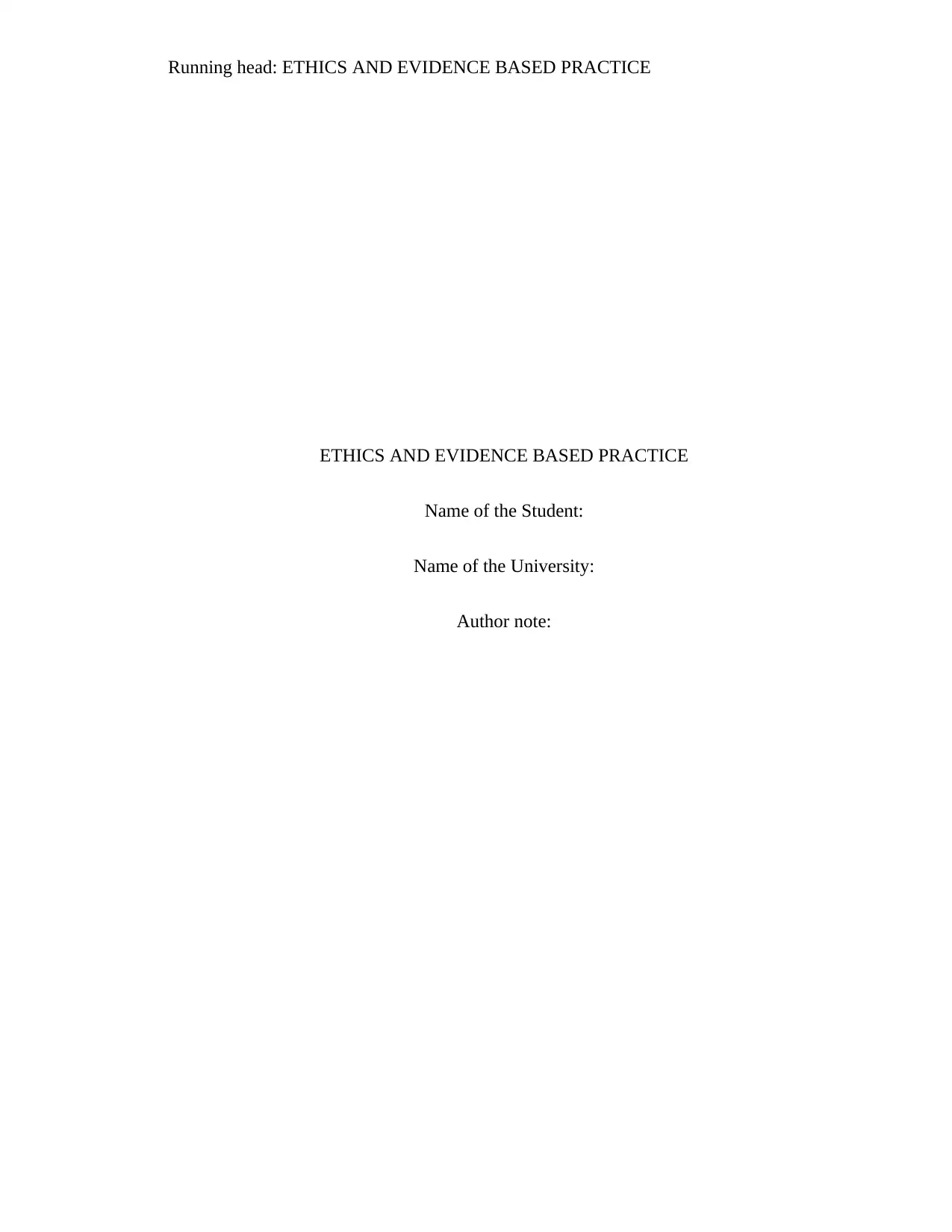
Running head: ETHICS AND EVIDENCE BASED PRACTICE
ETHICS AND EVIDENCE BASED PRACTICE
Name of the Student:
Name of the University:
Author note:
ETHICS AND EVIDENCE BASED PRACTICE
Name of the Student:
Name of the University:
Author note:
Paraphrase This Document
Need a fresh take? Get an instant paraphrase of this document with our AI Paraphraser
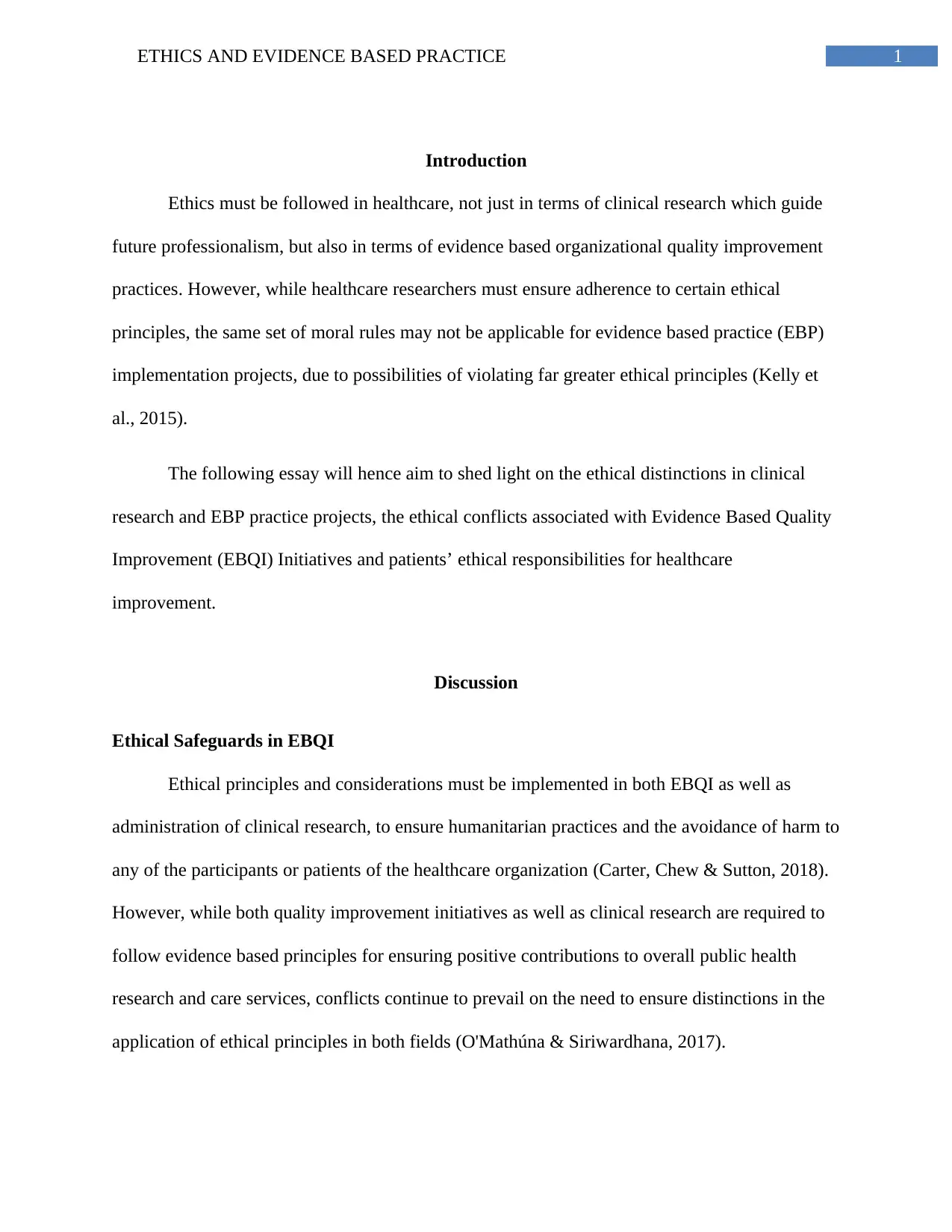
1ETHICS AND EVIDENCE BASED PRACTICE
Introduction
Ethics must be followed in healthcare, not just in terms of clinical research which guide
future professionalism, but also in terms of evidence based organizational quality improvement
practices. However, while healthcare researchers must ensure adherence to certain ethical
principles, the same set of moral rules may not be applicable for evidence based practice (EBP)
implementation projects, due to possibilities of violating far greater ethical principles (Kelly et
al., 2015).
The following essay will hence aim to shed light on the ethical distinctions in clinical
research and EBP practice projects, the ethical conflicts associated with Evidence Based Quality
Improvement (EBQI) Initiatives and patients’ ethical responsibilities for healthcare
improvement.
Discussion
Ethical Safeguards in EBQI
Ethical principles and considerations must be implemented in both EBQI as well as
administration of clinical research, to ensure humanitarian practices and the avoidance of harm to
any of the participants or patients of the healthcare organization (Carter, Chew & Sutton, 2018).
However, while both quality improvement initiatives as well as clinical research are required to
follow evidence based principles for ensuring positive contributions to overall public health
research and care services, conflicts continue to prevail on the need to ensure distinctions in the
application of ethical principles in both fields (O'Mathúna & Siriwardhana, 2017).
Introduction
Ethics must be followed in healthcare, not just in terms of clinical research which guide
future professionalism, but also in terms of evidence based organizational quality improvement
practices. However, while healthcare researchers must ensure adherence to certain ethical
principles, the same set of moral rules may not be applicable for evidence based practice (EBP)
implementation projects, due to possibilities of violating far greater ethical principles (Kelly et
al., 2015).
The following essay will hence aim to shed light on the ethical distinctions in clinical
research and EBP practice projects, the ethical conflicts associated with Evidence Based Quality
Improvement (EBQI) Initiatives and patients’ ethical responsibilities for healthcare
improvement.
Discussion
Ethical Safeguards in EBQI
Ethical principles and considerations must be implemented in both EBQI as well as
administration of clinical research, to ensure humanitarian practices and the avoidance of harm to
any of the participants or patients of the healthcare organization (Carter, Chew & Sutton, 2018).
However, while both quality improvement initiatives as well as clinical research are required to
follow evidence based principles for ensuring positive contributions to overall public health
research and care services, conflicts continue to prevail on the need to ensure distinctions in the
application of ethical principles in both fields (O'Mathúna & Siriwardhana, 2017).
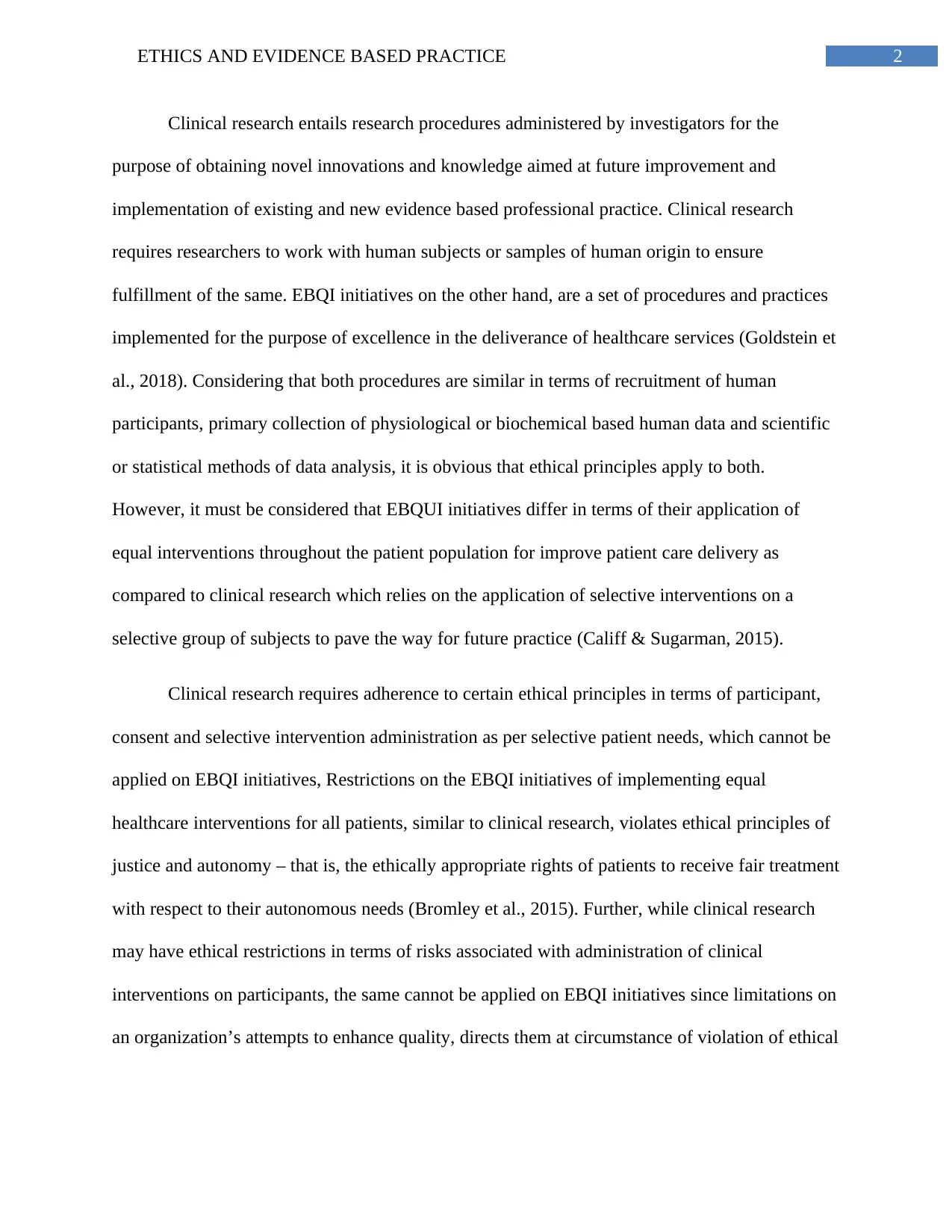
2ETHICS AND EVIDENCE BASED PRACTICE
Clinical research entails research procedures administered by investigators for the
purpose of obtaining novel innovations and knowledge aimed at future improvement and
implementation of existing and new evidence based professional practice. Clinical research
requires researchers to work with human subjects or samples of human origin to ensure
fulfillment of the same. EBQI initiatives on the other hand, are a set of procedures and practices
implemented for the purpose of excellence in the deliverance of healthcare services (Goldstein et
al., 2018). Considering that both procedures are similar in terms of recruitment of human
participants, primary collection of physiological or biochemical based human data and scientific
or statistical methods of data analysis, it is obvious that ethical principles apply to both.
However, it must be considered that EBQUI initiatives differ in terms of their application of
equal interventions throughout the patient population for improve patient care delivery as
compared to clinical research which relies on the application of selective interventions on a
selective group of subjects to pave the way for future practice (Califf & Sugarman, 2015).
Clinical research requires adherence to certain ethical principles in terms of participant,
consent and selective intervention administration as per selective patient needs, which cannot be
applied on EBQI initiatives, Restrictions on the EBQI initiatives of implementing equal
healthcare interventions for all patients, similar to clinical research, violates ethical principles of
justice and autonomy – that is, the ethically appropriate rights of patients to receive fair treatment
with respect to their autonomous needs (Bromley et al., 2015). Further, while clinical research
may have ethical restrictions in terms of risks associated with administration of clinical
interventions on participants, the same cannot be applied on EBQI initiatives since limitations on
an organization’s attempts to enhance quality, directs them at circumstance of violation of ethical
Clinical research entails research procedures administered by investigators for the
purpose of obtaining novel innovations and knowledge aimed at future improvement and
implementation of existing and new evidence based professional practice. Clinical research
requires researchers to work with human subjects or samples of human origin to ensure
fulfillment of the same. EBQI initiatives on the other hand, are a set of procedures and practices
implemented for the purpose of excellence in the deliverance of healthcare services (Goldstein et
al., 2018). Considering that both procedures are similar in terms of recruitment of human
participants, primary collection of physiological or biochemical based human data and scientific
or statistical methods of data analysis, it is obvious that ethical principles apply to both.
However, it must be considered that EBQUI initiatives differ in terms of their application of
equal interventions throughout the patient population for improve patient care delivery as
compared to clinical research which relies on the application of selective interventions on a
selective group of subjects to pave the way for future practice (Califf & Sugarman, 2015).
Clinical research requires adherence to certain ethical principles in terms of participant,
consent and selective intervention administration as per selective patient needs, which cannot be
applied on EBQI initiatives, Restrictions on the EBQI initiatives of implementing equal
healthcare interventions for all patients, similar to clinical research, violates ethical principles of
justice and autonomy – that is, the ethically appropriate rights of patients to receive fair treatment
with respect to their autonomous needs (Bromley et al., 2015). Further, while clinical research
may have ethical restrictions in terms of risks associated with administration of clinical
interventions on participants, the same cannot be applied on EBQI initiatives since limitations on
an organization’s attempts to enhance quality, directs them at circumstance of violation of ethical
⊘ This is a preview!⊘
Do you want full access?
Subscribe today to unlock all pages.

Trusted by 1+ million students worldwide
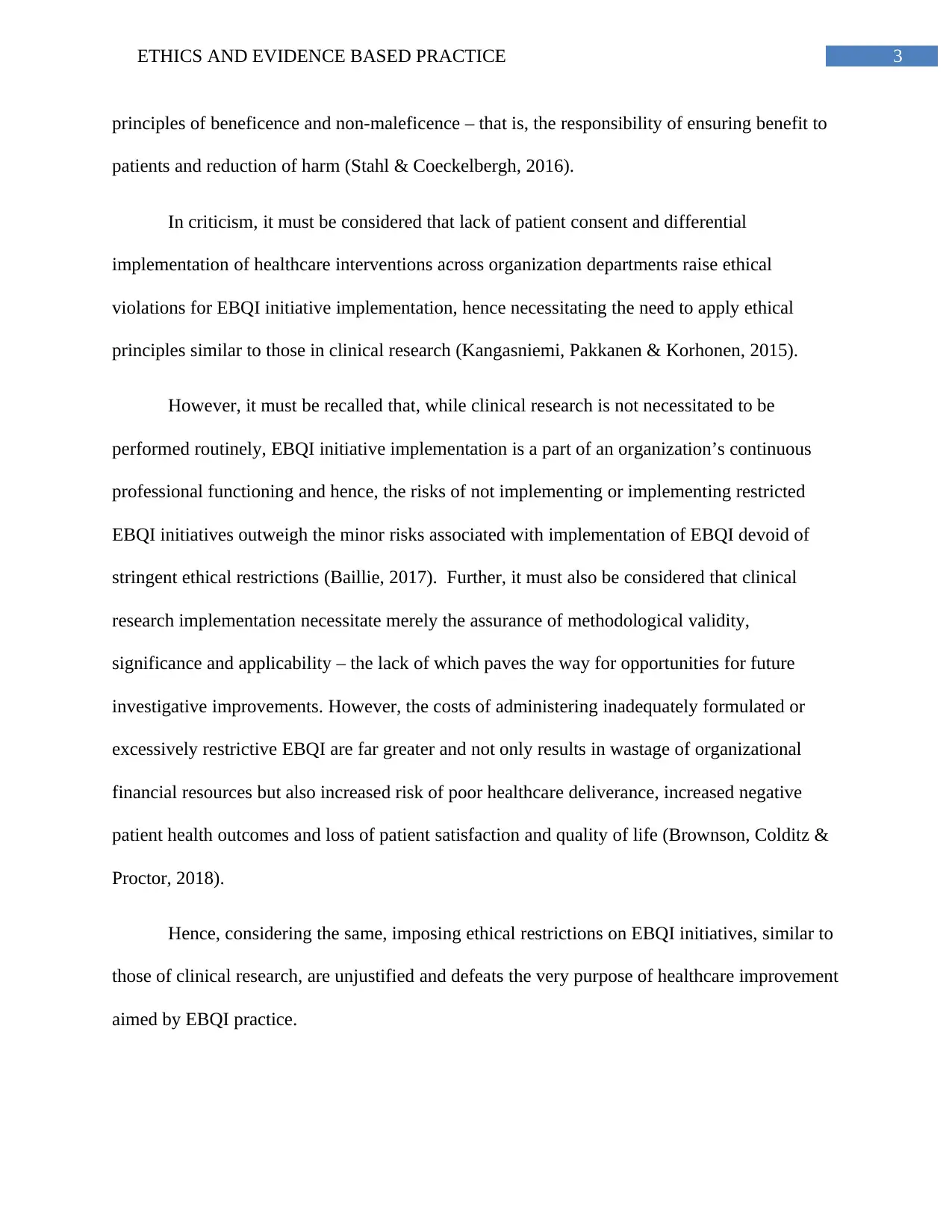
3ETHICS AND EVIDENCE BASED PRACTICE
principles of beneficence and non-maleficence – that is, the responsibility of ensuring benefit to
patients and reduction of harm (Stahl & Coeckelbergh, 2016).
In criticism, it must be considered that lack of patient consent and differential
implementation of healthcare interventions across organization departments raise ethical
violations for EBQI initiative implementation, hence necessitating the need to apply ethical
principles similar to those in clinical research (Kangasniemi, Pakkanen & Korhonen, 2015).
However, it must be recalled that, while clinical research is not necessitated to be
performed routinely, EBQI initiative implementation is a part of an organization’s continuous
professional functioning and hence, the risks of not implementing or implementing restricted
EBQI initiatives outweigh the minor risks associated with implementation of EBQI devoid of
stringent ethical restrictions (Baillie, 2017). Further, it must also be considered that clinical
research implementation necessitate merely the assurance of methodological validity,
significance and applicability – the lack of which paves the way for opportunities for future
investigative improvements. However, the costs of administering inadequately formulated or
excessively restrictive EBQI are far greater and not only results in wastage of organizational
financial resources but also increased risk of poor healthcare deliverance, increased negative
patient health outcomes and loss of patient satisfaction and quality of life (Brownson, Colditz &
Proctor, 2018).
Hence, considering the same, imposing ethical restrictions on EBQI initiatives, similar to
those of clinical research, are unjustified and defeats the very purpose of healthcare improvement
aimed by EBQI practice.
principles of beneficence and non-maleficence – that is, the responsibility of ensuring benefit to
patients and reduction of harm (Stahl & Coeckelbergh, 2016).
In criticism, it must be considered that lack of patient consent and differential
implementation of healthcare interventions across organization departments raise ethical
violations for EBQI initiative implementation, hence necessitating the need to apply ethical
principles similar to those in clinical research (Kangasniemi, Pakkanen & Korhonen, 2015).
However, it must be recalled that, while clinical research is not necessitated to be
performed routinely, EBQI initiative implementation is a part of an organization’s continuous
professional functioning and hence, the risks of not implementing or implementing restricted
EBQI initiatives outweigh the minor risks associated with implementation of EBQI devoid of
stringent ethical restrictions (Baillie, 2017). Further, it must also be considered that clinical
research implementation necessitate merely the assurance of methodological validity,
significance and applicability – the lack of which paves the way for opportunities for future
investigative improvements. However, the costs of administering inadequately formulated or
excessively restrictive EBQI are far greater and not only results in wastage of organizational
financial resources but also increased risk of poor healthcare deliverance, increased negative
patient health outcomes and loss of patient satisfaction and quality of life (Brownson, Colditz &
Proctor, 2018).
Hence, considering the same, imposing ethical restrictions on EBQI initiatives, similar to
those of clinical research, are unjustified and defeats the very purpose of healthcare improvement
aimed by EBQI practice.
Paraphrase This Document
Need a fresh take? Get an instant paraphrase of this document with our AI Paraphraser
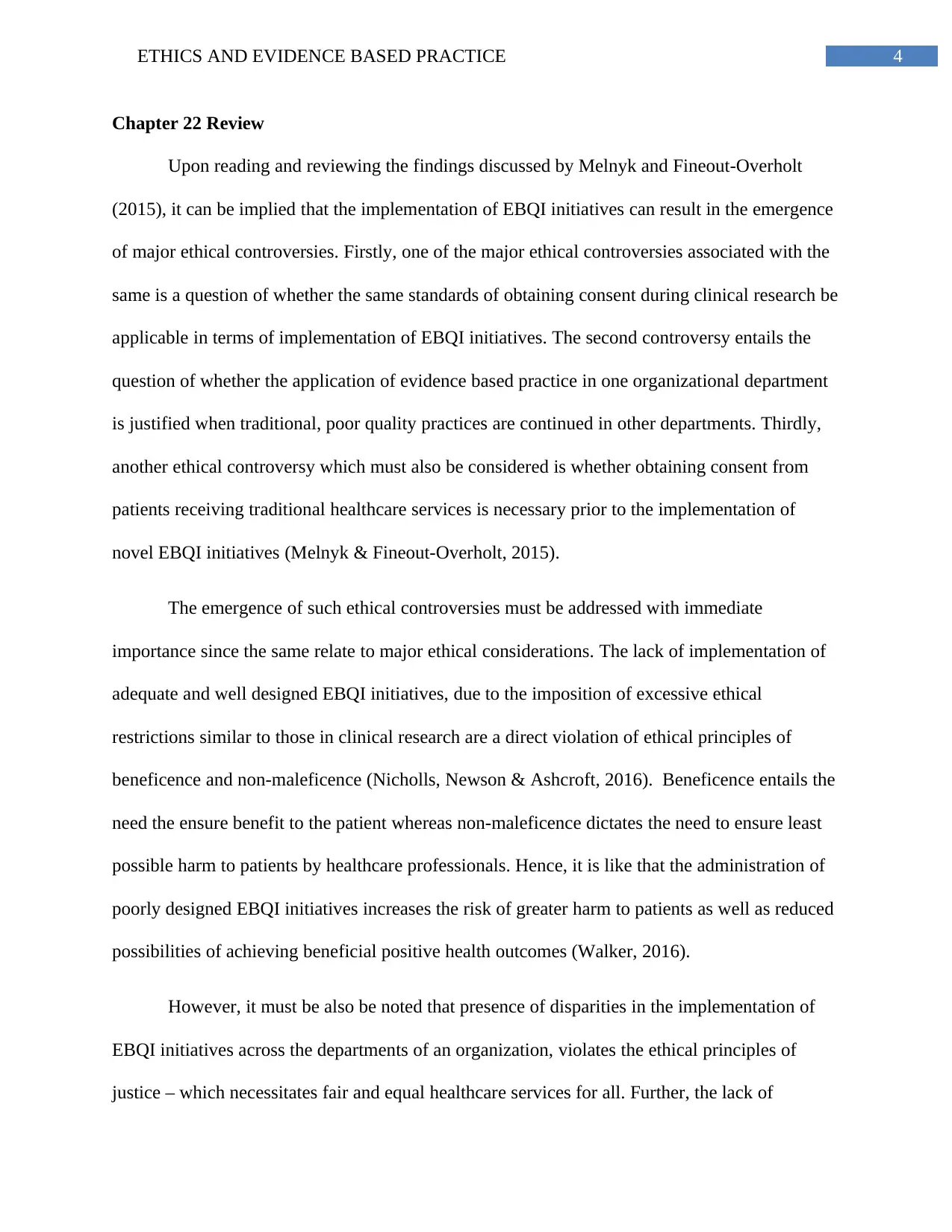
4ETHICS AND EVIDENCE BASED PRACTICE
Chapter 22 Review
Upon reading and reviewing the findings discussed by Melnyk and Fineout-Overholt
(2015), it can be implied that the implementation of EBQI initiatives can result in the emergence
of major ethical controversies. Firstly, one of the major ethical controversies associated with the
same is a question of whether the same standards of obtaining consent during clinical research be
applicable in terms of implementation of EBQI initiatives. The second controversy entails the
question of whether the application of evidence based practice in one organizational department
is justified when traditional, poor quality practices are continued in other departments. Thirdly,
another ethical controversy which must also be considered is whether obtaining consent from
patients receiving traditional healthcare services is necessary prior to the implementation of
novel EBQI initiatives (Melnyk & Fineout-Overholt, 2015).
The emergence of such ethical controversies must be addressed with immediate
importance since the same relate to major ethical considerations. The lack of implementation of
adequate and well designed EBQI initiatives, due to the imposition of excessive ethical
restrictions similar to those in clinical research are a direct violation of ethical principles of
beneficence and non-maleficence (Nicholls, Newson & Ashcroft, 2016). Beneficence entails the
need the ensure benefit to the patient whereas non-maleficence dictates the need to ensure least
possible harm to patients by healthcare professionals. Hence, it is like that the administration of
poorly designed EBQI initiatives increases the risk of greater harm to patients as well as reduced
possibilities of achieving beneficial positive health outcomes (Walker, 2016).
However, it must be also be noted that presence of disparities in the implementation of
EBQI initiatives across the departments of an organization, violates the ethical principles of
justice – which necessitates fair and equal healthcare services for all. Further, the lack of
Chapter 22 Review
Upon reading and reviewing the findings discussed by Melnyk and Fineout-Overholt
(2015), it can be implied that the implementation of EBQI initiatives can result in the emergence
of major ethical controversies. Firstly, one of the major ethical controversies associated with the
same is a question of whether the same standards of obtaining consent during clinical research be
applicable in terms of implementation of EBQI initiatives. The second controversy entails the
question of whether the application of evidence based practice in one organizational department
is justified when traditional, poor quality practices are continued in other departments. Thirdly,
another ethical controversy which must also be considered is whether obtaining consent from
patients receiving traditional healthcare services is necessary prior to the implementation of
novel EBQI initiatives (Melnyk & Fineout-Overholt, 2015).
The emergence of such ethical controversies must be addressed with immediate
importance since the same relate to major ethical considerations. The lack of implementation of
adequate and well designed EBQI initiatives, due to the imposition of excessive ethical
restrictions similar to those in clinical research are a direct violation of ethical principles of
beneficence and non-maleficence (Nicholls, Newson & Ashcroft, 2016). Beneficence entails the
need the ensure benefit to the patient whereas non-maleficence dictates the need to ensure least
possible harm to patients by healthcare professionals. Hence, it is like that the administration of
poorly designed EBQI initiatives increases the risk of greater harm to patients as well as reduced
possibilities of achieving beneficial positive health outcomes (Walker, 2016).
However, it must be also be noted that presence of disparities in the implementation of
EBQI initiatives across the departments of an organization, violates the ethical principles of
justice – which necessitates fair and equal healthcare services for all. Further, the lack of
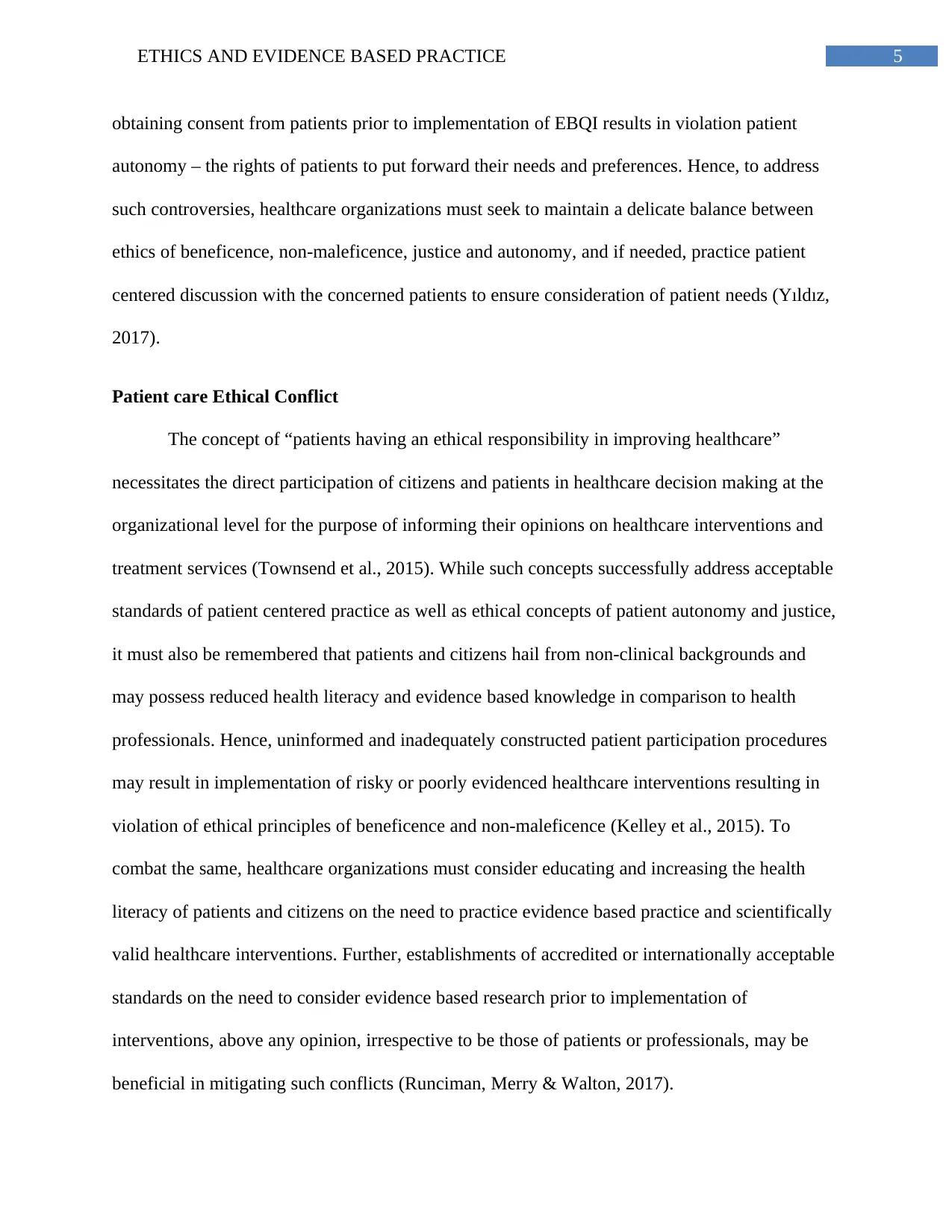
5ETHICS AND EVIDENCE BASED PRACTICE
obtaining consent from patients prior to implementation of EBQI results in violation patient
autonomy – the rights of patients to put forward their needs and preferences. Hence, to address
such controversies, healthcare organizations must seek to maintain a delicate balance between
ethics of beneficence, non-maleficence, justice and autonomy, and if needed, practice patient
centered discussion with the concerned patients to ensure consideration of patient needs (Yıldız,
2017).
Patient care Ethical Conflict
The concept of “patients having an ethical responsibility in improving healthcare”
necessitates the direct participation of citizens and patients in healthcare decision making at the
organizational level for the purpose of informing their opinions on healthcare interventions and
treatment services (Townsend et al., 2015). While such concepts successfully address acceptable
standards of patient centered practice as well as ethical concepts of patient autonomy and justice,
it must also be remembered that patients and citizens hail from non-clinical backgrounds and
may possess reduced health literacy and evidence based knowledge in comparison to health
professionals. Hence, uninformed and inadequately constructed patient participation procedures
may result in implementation of risky or poorly evidenced healthcare interventions resulting in
violation of ethical principles of beneficence and non-maleficence (Kelley et al., 2015). To
combat the same, healthcare organizations must consider educating and increasing the health
literacy of patients and citizens on the need to practice evidence based practice and scientifically
valid healthcare interventions. Further, establishments of accredited or internationally acceptable
standards on the need to consider evidence based research prior to implementation of
interventions, above any opinion, irrespective to be those of patients or professionals, may be
beneficial in mitigating such conflicts (Runciman, Merry & Walton, 2017).
obtaining consent from patients prior to implementation of EBQI results in violation patient
autonomy – the rights of patients to put forward their needs and preferences. Hence, to address
such controversies, healthcare organizations must seek to maintain a delicate balance between
ethics of beneficence, non-maleficence, justice and autonomy, and if needed, practice patient
centered discussion with the concerned patients to ensure consideration of patient needs (Yıldız,
2017).
Patient care Ethical Conflict
The concept of “patients having an ethical responsibility in improving healthcare”
necessitates the direct participation of citizens and patients in healthcare decision making at the
organizational level for the purpose of informing their opinions on healthcare interventions and
treatment services (Townsend et al., 2015). While such concepts successfully address acceptable
standards of patient centered practice as well as ethical concepts of patient autonomy and justice,
it must also be remembered that patients and citizens hail from non-clinical backgrounds and
may possess reduced health literacy and evidence based knowledge in comparison to health
professionals. Hence, uninformed and inadequately constructed patient participation procedures
may result in implementation of risky or poorly evidenced healthcare interventions resulting in
violation of ethical principles of beneficence and non-maleficence (Kelley et al., 2015). To
combat the same, healthcare organizations must consider educating and increasing the health
literacy of patients and citizens on the need to practice evidence based practice and scientifically
valid healthcare interventions. Further, establishments of accredited or internationally acceptable
standards on the need to consider evidence based research prior to implementation of
interventions, above any opinion, irrespective to be those of patients or professionals, may be
beneficial in mitigating such conflicts (Runciman, Merry & Walton, 2017).
⊘ This is a preview!⊘
Do you want full access?
Subscribe today to unlock all pages.

Trusted by 1+ million students worldwide
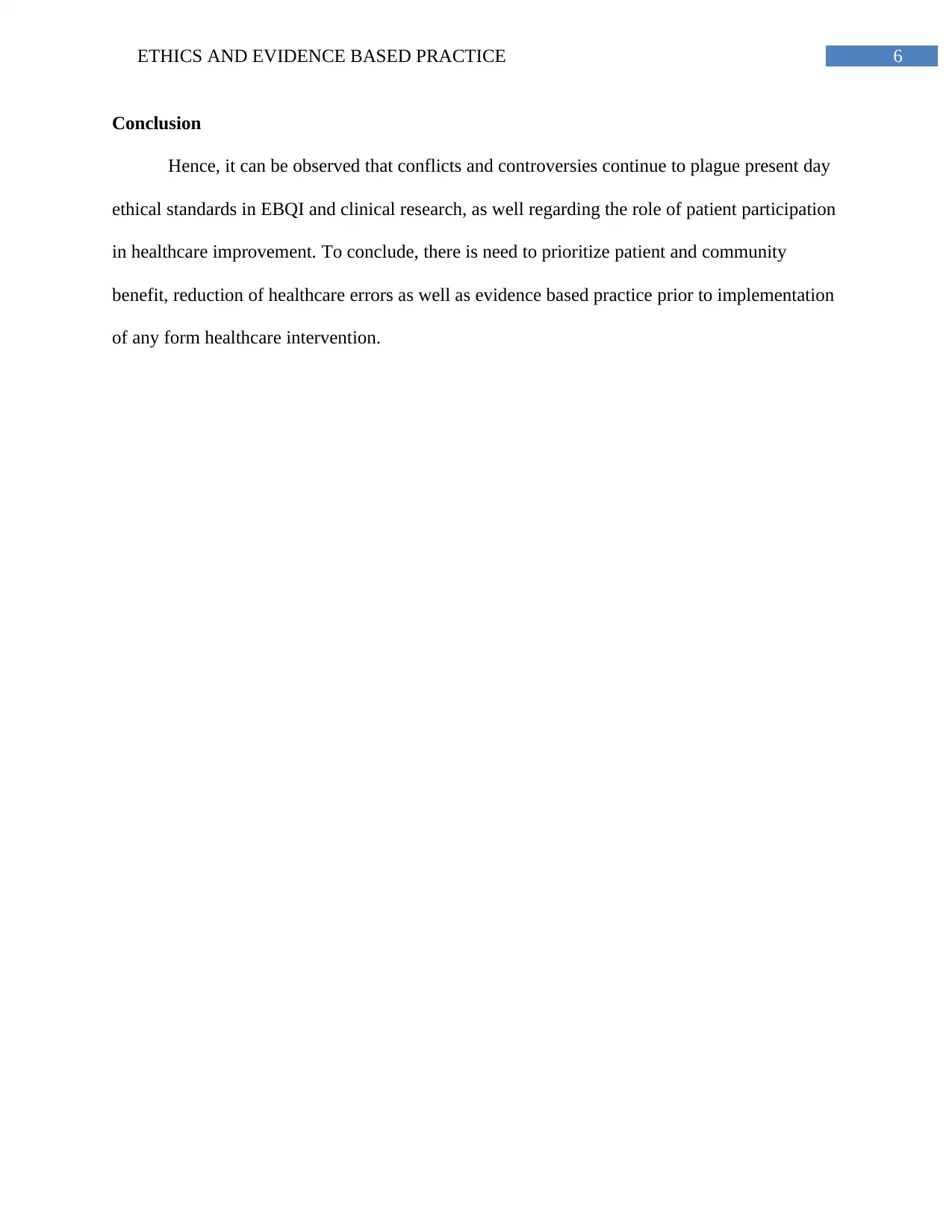
6ETHICS AND EVIDENCE BASED PRACTICE
Conclusion
Hence, it can be observed that conflicts and controversies continue to plague present day
ethical standards in EBQI and clinical research, as well regarding the role of patient participation
in healthcare improvement. To conclude, there is need to prioritize patient and community
benefit, reduction of healthcare errors as well as evidence based practice prior to implementation
of any form healthcare intervention.
Conclusion
Hence, it can be observed that conflicts and controversies continue to plague present day
ethical standards in EBQI and clinical research, as well regarding the role of patient participation
in healthcare improvement. To conclude, there is need to prioritize patient and community
benefit, reduction of healthcare errors as well as evidence based practice prior to implementation
of any form healthcare intervention.
Paraphrase This Document
Need a fresh take? Get an instant paraphrase of this document with our AI Paraphraser
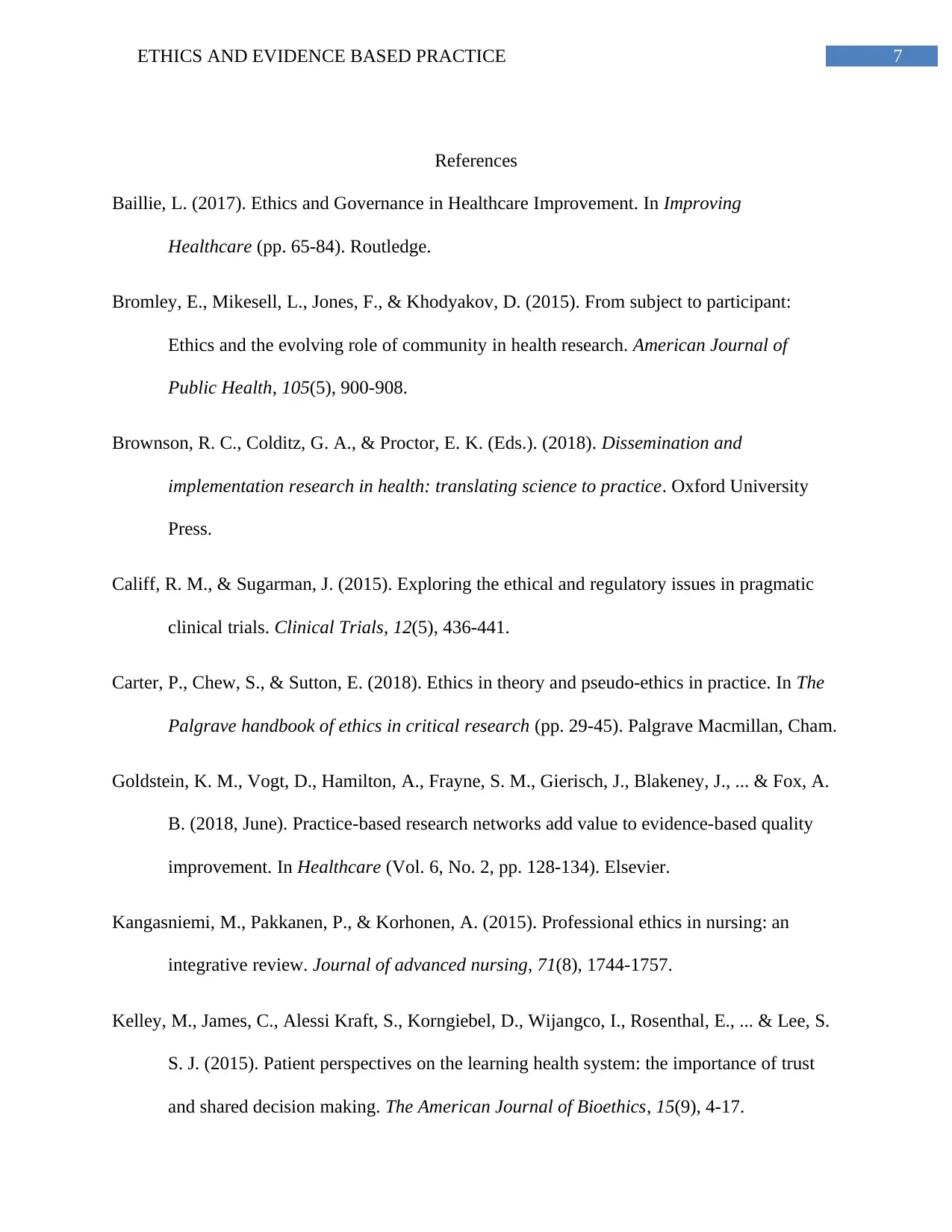
7ETHICS AND EVIDENCE BASED PRACTICE
References
Baillie, L. (2017). Ethics and Governance in Healthcare Improvement. In Improving
Healthcare (pp. 65-84). Routledge.
Bromley, E., Mikesell, L., Jones, F., & Khodyakov, D. (2015). From subject to participant:
Ethics and the evolving role of community in health research. American Journal of
Public Health, 105(5), 900-908.
Brownson, R. C., Colditz, G. A., & Proctor, E. K. (Eds.). (2018). Dissemination and
implementation research in health: translating science to practice. Oxford University
Press.
Califf, R. M., & Sugarman, J. (2015). Exploring the ethical and regulatory issues in pragmatic
clinical trials. Clinical Trials, 12(5), 436-441.
Carter, P., Chew, S., & Sutton, E. (2018). Ethics in theory and pseudo-ethics in practice. In The
Palgrave handbook of ethics in critical research (pp. 29-45). Palgrave Macmillan, Cham.
Goldstein, K. M., Vogt, D., Hamilton, A., Frayne, S. M., Gierisch, J., Blakeney, J., ... & Fox, A.
B. (2018, June). Practice-based research networks add value to evidence-based quality
improvement. In Healthcare (Vol. 6, No. 2, pp. 128-134). Elsevier.
Kangasniemi, M., Pakkanen, P., & Korhonen, A. (2015). Professional ethics in nursing: an
integrative review. Journal of advanced nursing, 71(8), 1744-1757.
Kelley, M., James, C., Alessi Kraft, S., Korngiebel, D., Wijangco, I., Rosenthal, E., ... & Lee, S.
S. J. (2015). Patient perspectives on the learning health system: the importance of trust
and shared decision making. The American Journal of Bioethics, 15(9), 4-17.
References
Baillie, L. (2017). Ethics and Governance in Healthcare Improvement. In Improving
Healthcare (pp. 65-84). Routledge.
Bromley, E., Mikesell, L., Jones, F., & Khodyakov, D. (2015). From subject to participant:
Ethics and the evolving role of community in health research. American Journal of
Public Health, 105(5), 900-908.
Brownson, R. C., Colditz, G. A., & Proctor, E. K. (Eds.). (2018). Dissemination and
implementation research in health: translating science to practice. Oxford University
Press.
Califf, R. M., & Sugarman, J. (2015). Exploring the ethical and regulatory issues in pragmatic
clinical trials. Clinical Trials, 12(5), 436-441.
Carter, P., Chew, S., & Sutton, E. (2018). Ethics in theory and pseudo-ethics in practice. In The
Palgrave handbook of ethics in critical research (pp. 29-45). Palgrave Macmillan, Cham.
Goldstein, K. M., Vogt, D., Hamilton, A., Frayne, S. M., Gierisch, J., Blakeney, J., ... & Fox, A.
B. (2018, June). Practice-based research networks add value to evidence-based quality
improvement. In Healthcare (Vol. 6, No. 2, pp. 128-134). Elsevier.
Kangasniemi, M., Pakkanen, P., & Korhonen, A. (2015). Professional ethics in nursing: an
integrative review. Journal of advanced nursing, 71(8), 1744-1757.
Kelley, M., James, C., Alessi Kraft, S., Korngiebel, D., Wijangco, I., Rosenthal, E., ... & Lee, S.
S. J. (2015). Patient perspectives on the learning health system: the importance of trust
and shared decision making. The American Journal of Bioethics, 15(9), 4-17.
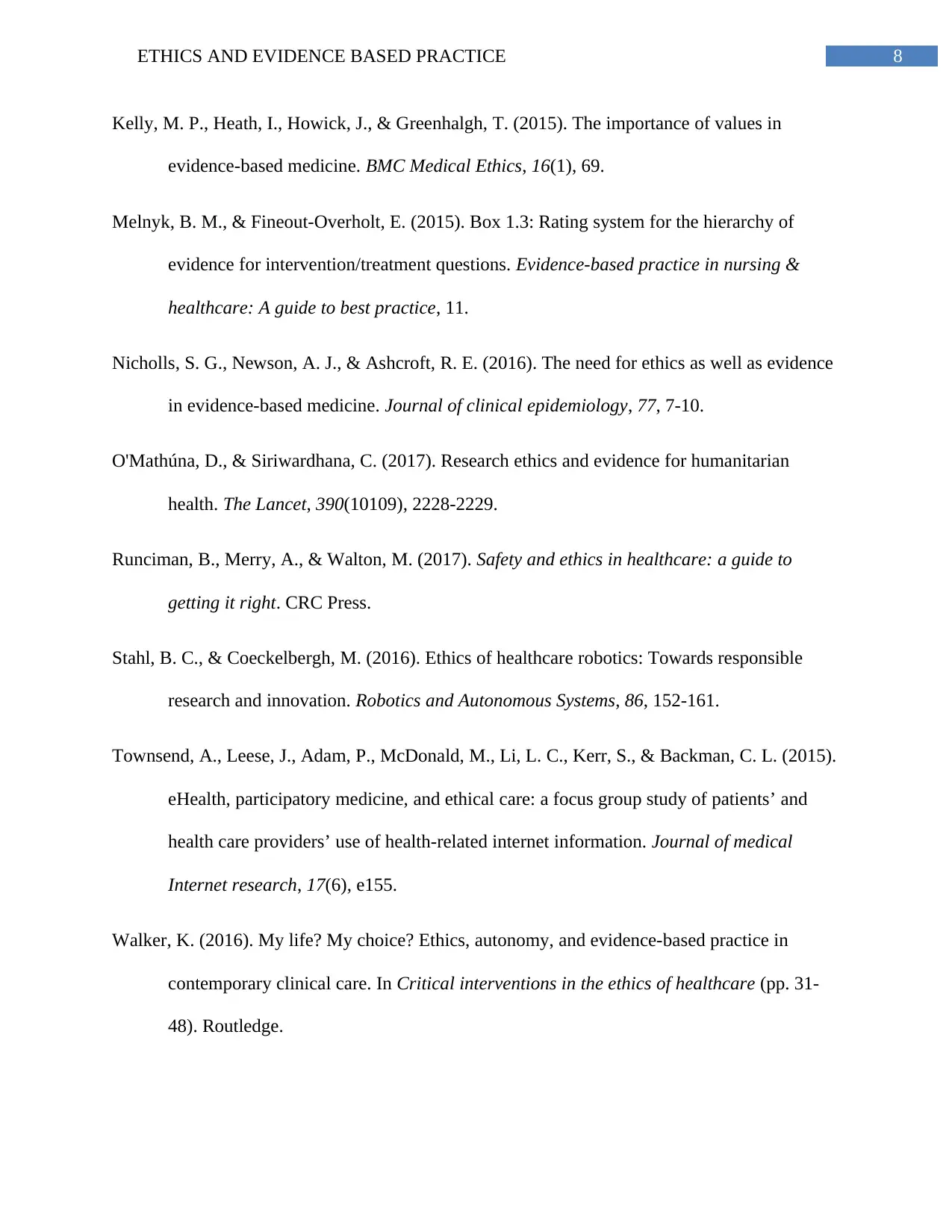
8ETHICS AND EVIDENCE BASED PRACTICE
Kelly, M. P., Heath, I., Howick, J., & Greenhalgh, T. (2015). The importance of values in
evidence-based medicine. BMC Medical Ethics, 16(1), 69.
Melnyk, B. M., & Fineout-Overholt, E. (2015). Box 1.3: Rating system for the hierarchy of
evidence for intervention/treatment questions. Evidence-based practice in nursing &
healthcare: A guide to best practice, 11.
Nicholls, S. G., Newson, A. J., & Ashcroft, R. E. (2016). The need for ethics as well as evidence
in evidence-based medicine. Journal of clinical epidemiology, 77, 7-10.
O'Mathúna, D., & Siriwardhana, C. (2017). Research ethics and evidence for humanitarian
health. The Lancet, 390(10109), 2228-2229.
Runciman, B., Merry, A., & Walton, M. (2017). Safety and ethics in healthcare: a guide to
getting it right. CRC Press.
Stahl, B. C., & Coeckelbergh, M. (2016). Ethics of healthcare robotics: Towards responsible
research and innovation. Robotics and Autonomous Systems, 86, 152-161.
Townsend, A., Leese, J., Adam, P., McDonald, M., Li, L. C., Kerr, S., & Backman, C. L. (2015).
eHealth, participatory medicine, and ethical care: a focus group study of patients’ and
health care providers’ use of health-related internet information. Journal of medical
Internet research, 17(6), e155.
Walker, K. (2016). My life? My choice? Ethics, autonomy, and evidence-based practice in
contemporary clinical care. In Critical interventions in the ethics of healthcare (pp. 31-
48). Routledge.
Kelly, M. P., Heath, I., Howick, J., & Greenhalgh, T. (2015). The importance of values in
evidence-based medicine. BMC Medical Ethics, 16(1), 69.
Melnyk, B. M., & Fineout-Overholt, E. (2015). Box 1.3: Rating system for the hierarchy of
evidence for intervention/treatment questions. Evidence-based practice in nursing &
healthcare: A guide to best practice, 11.
Nicholls, S. G., Newson, A. J., & Ashcroft, R. E. (2016). The need for ethics as well as evidence
in evidence-based medicine. Journal of clinical epidemiology, 77, 7-10.
O'Mathúna, D., & Siriwardhana, C. (2017). Research ethics and evidence for humanitarian
health. The Lancet, 390(10109), 2228-2229.
Runciman, B., Merry, A., & Walton, M. (2017). Safety and ethics in healthcare: a guide to
getting it right. CRC Press.
Stahl, B. C., & Coeckelbergh, M. (2016). Ethics of healthcare robotics: Towards responsible
research and innovation. Robotics and Autonomous Systems, 86, 152-161.
Townsend, A., Leese, J., Adam, P., McDonald, M., Li, L. C., Kerr, S., & Backman, C. L. (2015).
eHealth, participatory medicine, and ethical care: a focus group study of patients’ and
health care providers’ use of health-related internet information. Journal of medical
Internet research, 17(6), e155.
Walker, K. (2016). My life? My choice? Ethics, autonomy, and evidence-based practice in
contemporary clinical care. In Critical interventions in the ethics of healthcare (pp. 31-
48). Routledge.
⊘ This is a preview!⊘
Do you want full access?
Subscribe today to unlock all pages.

Trusted by 1+ million students worldwide

9ETHICS AND EVIDENCE BASED PRACTICE
Yıldız, E. (2017). Ethics in nursing: A systematic review of the framework of evidence
perspective. Nursing ethics, 0969733017734412.
Yıldız, E. (2017). Ethics in nursing: A systematic review of the framework of evidence
perspective. Nursing ethics, 0969733017734412.
1 out of 10
Related Documents
Your All-in-One AI-Powered Toolkit for Academic Success.
+13062052269
info@desklib.com
Available 24*7 on WhatsApp / Email
![[object Object]](/_next/static/media/star-bottom.7253800d.svg)
Unlock your academic potential
Copyright © 2020–2026 A2Z Services. All Rights Reserved. Developed and managed by ZUCOL.





